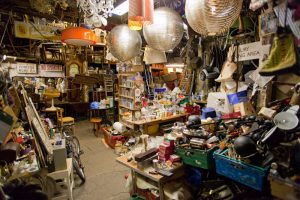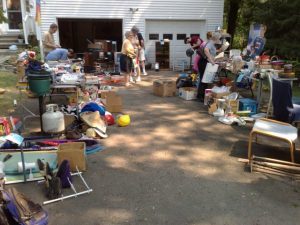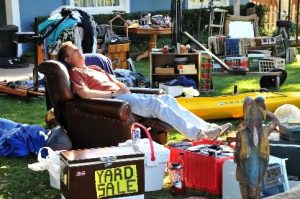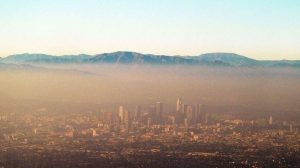Sometimes he felt as though he’d wandered into a world where everyone’s life had been spilled out like a gut-shot man, as if their sentiment and possessions were stacked in boxes at a planet-wide yard sale. He thought of what his life would resemble, all the liquor bottles having not quite made it to the recycle bin taunting him from a college sophomore’s top shelf.  There would be wedding rings and pawnshop promises scattered to the horizon and the only thing that would save him from crippling humiliation would be the millions of other displays that were the tragic comic lives of everyone else.
There would be wedding rings and pawnshop promises scattered to the horizon and the only thing that would save him from crippling humiliation would be the millions of other displays that were the tragic comic lives of everyone else.
It was yardsale day off the main road, and he’d wandered into it by mistake, his shoes scuffed by the uneven sidewalk and unfriendly curbs. The time periods were easy enough to tell by the owner’s crushed faces, even if the metal toys and spray on window-frost were not a giveaway. He pretended an interest he didn’t feel, thinking only about escaping, as if the highway lay on the other side of a million compartmentalized lives. He avoiding meeting anyone’s eyes,  letting his fingers drift over vinyl albums from the fifties, yellow piles of National Geographic and rumpled piles of children’s clothes.
letting his fingers drift over vinyl albums from the fifties, yellow piles of National Geographic and rumpled piles of children’s clothes.
If he were to buy, he knew he would have to buy the lot, and then, staggering, he would go back to his car carrying the most meaningful part of their life. He would bring the hasty decisions and regrets, the petty triumphs and Walmart-greeter lives back to his own apartment and there they would fester until they invaded his own life. He would find his hobbies taken over by half-finished needlepoint and he would have to buy cigars to feed the cigar cutter he had no real use for.
He gave up on the debris from their broken lives and began to watch the people who would have nothing to do with their sales. They were a mixed group.  Children with tear-streaked faces watched their favoirite toys bought for pocket change, dolls they had embraced through nights too terrible to recall grasped by the greedy hand of their parent’s avarice and then thrown into the gaping maw of the cement truck appreciation of a child as unlike them as a winter day is like a dandelion. There were mothers who watched people paw over the shirt their baby had been wearing when he first walked, heard them bargain with the husband from where she stood on the step, taking that precious memory for twenty cents and almost dropping it as they gathered their armful of what might as well be stolen goods. Some fathers saw tools that they had never used but had been worn by their father’s hands disappear into plastic bags and the thanks that accompanied the crumpled bills suddenly corrupted their past with cheap tinsel and twisted fir of a Christmas tree kept long past the point it had browned into dry rot.
Children with tear-streaked faces watched their favoirite toys bought for pocket change, dolls they had embraced through nights too terrible to recall grasped by the greedy hand of their parent’s avarice and then thrown into the gaping maw of the cement truck appreciation of a child as unlike them as a winter day is like a dandelion. There were mothers who watched people paw over the shirt their baby had been wearing when he first walked, heard them bargain with the husband from where she stood on the step, taking that precious memory for twenty cents and almost dropping it as they gathered their armful of what might as well be stolen goods. Some fathers saw tools that they had never used but had been worn by their father’s hands disappear into plastic bags and the thanks that accompanied the crumpled bills suddenly corrupted their past with cheap tinsel and twisted fir of a Christmas tree kept long past the point it had browned into dry rot.
He needed to retrace his steps. Behind him, somewhere beyond the trinkets and toys, the ties and piles of granny squares that would have been an afghan if  grandma had lived long enough, somewhere behind plastic furniture and chipboard discount lives, his car waited, its engine impatient for the road. He threaded his feet, placing them sideways amongst the boxes and spilled contents of tables in order to avoid stepping on the goods he might suddenly owe someone a quarter for, but the piles were oddly similar. He’d seen purpled hands grasping bulging bags, as their new owners—little knowing that their new goods were more dangerous than poison or weaponized fertilizer—carried them to their own homes. Hundreds of pounds of clothing and differently shaped plastic junk had been swallowed but he now realized the supply was endless.
grandma had lived long enough, somewhere behind plastic furniture and chipboard discount lives, his car waited, its engine impatient for the road. He threaded his feet, placing them sideways amongst the boxes and spilled contents of tables in order to avoid stepping on the goods he might suddenly owe someone a quarter for, but the piles were oddly similar. He’d seen purpled hands grasping bulging bags, as their new owners—little knowing that their new goods were more dangerous than poison or weaponized fertilizer—carried them to their own homes. Hundreds of pounds of clothing and differently shaped plastic junk had been swallowed but he now realized the supply was endless.
The tables still creaked under the burden of twenty, forty, sixty years of living, and boxes were still overflowing with free or bargain marked down and cheap books and magazines and screwdrivers and old coffee mugs with slogans on the side. He suddenly realized that beneath each normal-looking home was a vast pit into which they had been throwing off-the-rack trash for generations. The bottomless pile that represented the human wish to cover their despair and fear with junk would mean the yard sale could last for years. Some children would be conceived in old copies of Playboy and months later born amongst the maternity wear. They would grow up on top of boxes of toys and play cryptic games under tablecloths while  others shopped. If their parents’ determination to clear out their cornucopia of a house continued, the kids might range wider into other yard sales, swapping out goods so that the great swirl of garbage that was the suburban crescents and bays could feed itself, chewing up its own children in order to greed-satisfy their parents. They would grow older amongst the teen novels and pellet guns, pawing over the clothes that were old styles come new again, until they were ready to take up professions. Then they would be into the books, a DIY series competing with physics and chemistry textbooks and literary works in perfect condition. They would eventually take their own part in the parade that was humanity pushing more and more garbage into its own mouth. Some of them would never leave the permanent yard sale that was their neighbourhood, and instead would suckle their children on the endless consumer cycle.
others shopped. If their parents’ determination to clear out their cornucopia of a house continued, the kids might range wider into other yard sales, swapping out goods so that the great swirl of garbage that was the suburban crescents and bays could feed itself, chewing up its own children in order to greed-satisfy their parents. They would grow older amongst the teen novels and pellet guns, pawing over the clothes that were old styles come new again, until they were ready to take up professions. Then they would be into the books, a DIY series competing with physics and chemistry textbooks and literary works in perfect condition. They would eventually take their own part in the parade that was humanity pushing more and more garbage into its own mouth. Some of them would never leave the permanent yard sale that was their neighbourhood, and instead would suckle their children on the endless consumer cycle.
Once the full horror of what he’d stumbled into came to him, Tom almost ran back to his car, ignoring the supplicating arms that held out a shirt and a tie, a monkey wrench and plaster Elvis. He pushed past hands like they were branches in an animate and malign forest, and stomped plastic containers and spilled record compilations as he ran. Once he was in the car, he drove above the city for the first time in a month, and there, high in the hills, he looked down through the brown smear that  belted the horizon with smog, and thought about the whirlpool he had barely escaped. Beyond the city was the Pacific, and in its centre swirled the great Pacific garbage patch. He’d never seen it, but he felt he knew more about it now that he’d noticed the permanent yard sale that was the lives of his neighbours. Like the patch, they circulated the trash until it broke down into its component parts, and then they drank the viscous slurry like energy drinks, ingesting enough plastic to get them through another day.
belted the horizon with smog, and thought about the whirlpool he had barely escaped. Beyond the city was the Pacific, and in its centre swirled the great Pacific garbage patch. He’d never seen it, but he felt he knew more about it now that he’d noticed the permanent yard sale that was the lives of his neighbours. Like the patch, they circulated the trash until it broke down into its component parts, and then they drank the viscous slurry like energy drinks, ingesting enough plastic to get them through another day.
It was dark when he drove below the smog line back into the city. The piles of clothing would still be on tables and the late night obsessed would be running fingers through rayon and pinching vinyl, but amongst the  clutter tired children would rest, their sticky hands still clutching toys and their mouths automatically chewing on the corner of a curtain or the remains of a pleather purse. He turned away from the sight, although he knew he would be haunted by porcelain dogs and glass figurines whenever he visited a friend’s home.
clutter tired children would rest, their sticky hands still clutching toys and their mouths automatically chewing on the corner of a curtain or the remains of a pleather purse. He turned away from the sight, although he knew he would be haunted by porcelain dogs and glass figurines whenever he visited a friend’s home.
